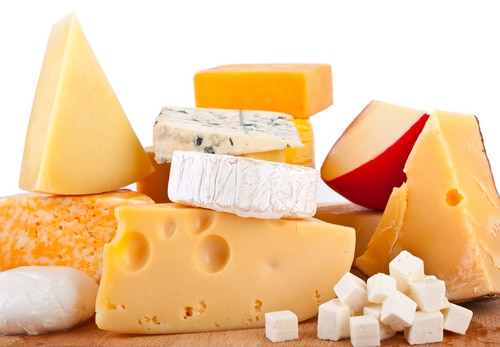Cheese gets a bad rap. Sure, cheese contains saturated fat, but it has other benefits that’ll make you think twice before giving it up completely. Despite its saturated fat, recent research suggests that cheese doesn’t elevate LDL-cholesterol levels. Scientists aren’t sure why, but they believe there could be some other component in cheese that prevents the expected rise in “bad” cholesterol levels. Here are some of the potential health benefits that eating moderate amounts of cheese offers.
Weight Control Benefits?

Helps Maintain Bone Density
About a third of women over the age of 50 will suffer from a bone fracture at some point due to osteoporosis and low bone density. One way to keep bones strong is to get enough dietary calcium and vitamin D. A single ounce of cheddar cheese provides more than 20% of the day’s calcium requirements. To boost the amount of calcium in your diet, even more, sprinkle your salad with parmesan cheese. An ounce of parmesan cheese supplies almost a third of the day’s calcium requirements, making it the most calcium-rich cheese at the supermarket.
It Helps Control Blood Pressure
The calcium in cheese helps blood vessels relax and is important for maintaining healthy blood pressure. According to a study published in the New England Journal of Medicine, eating three or more servings of dairy a day lowers blood pressure and reduces the risk of developing hypertension. Combine that with the fact that eating cheese in moderation doesn’t seem to increase LDL-cholesterol levels, and cheese doesn’t look so heart unhealthy after all.
It Reduces the Risk of Cavities
Enjoying cheese in moderation could help you save on dental bills. Research shows that eating cheese after a meal lowers the risk of dental cavities. Experts aren’t sure why, but cheese seems to reduce the build-up of enamel-destroying acids that form after a meal and contribute to tooth decay. Plus, the calcium in cheese helps to re-mineralize tooth enamel. It may not replace brushing and flossing, but nibbling on a nugget of cheese after a meal could help you save on dental bills.
The Bottom Line?
Cheese gets a bad rap because of the saturated fat it contains, but adding a little cheese to a healthy garden salad or other dish has a number of health benefits. Plus, the fat in cheese helps with the absorption of fat-soluble nutrients like carotenoids from a salad. If you’re looking for cheese with a lower fat content, try goat cheese, mozzarella, feta or cottage cheese instead. Feta and goat cheese add a lot of flavor, so you’ll be satisfied with less. If you’re concerned about the calories and fat, low-fat versions of full-fat cheese are an option, although the taste and texture are different. You may be more satisfied with eating less of a full-fat version. Enjoy cheese, but do it in moderation.
References:
J. Clin. Endocrin. Met. 85:4635.
FASEB J 2001, 15:291-293.
N Engl J Med 336: 1117–1124, 1997.

